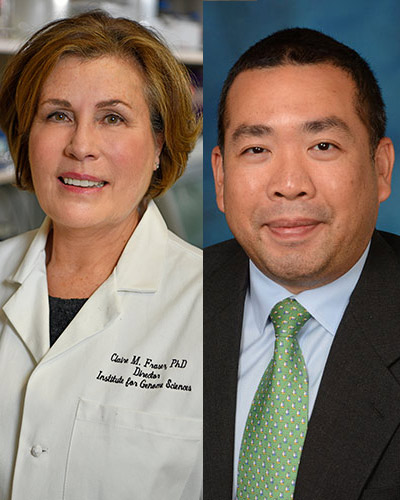December 04, 2018 | Joanne Morrison

Researchers will Examine Impact of Prebiotics and Immune System Function in Those with Schizophrenia
Researchers at the University of Maryland School of Medicine’s (UMSOM) Maryland Psychiatric Center (MPRC) and Institute for Genome Sciences (IGS), along with researchers at the University of Maryland School of Pharmacy (UMSOP), have been awarded a collaborative five-year $1.78 million grant to study the brain-to-gut connection in schizophrenia.
The Principal Investigator for the research is Robert W. Buchanan, MD, UMSOM Professor of Psychiatry and Director of the MPRC. Top collaborators for this research are Claire Fraser, PhD, the Dean’s Endowed Professor and Director of IGS, Deanna L. Kelly, PharmD, BCPP, UMSOM Professor of Psychiatry and Maureen Kane, PhD, Associate Professor of Pharmaceutical Sciences at the School of Pharmacy.
“I am incredibly excited to be able to collaborate with such a distinguished group of investigators on such an important project. The study has the potential to open up an entirely new avenue of treatment development research,” said Dr. Buchanan.
There is considerable evidence to suggest that schizophrenia is characterized by abnormalities of the immune system, including elevated levels of cytokines, microglia activation, and genetic polymorphisms in the human leukocyte antigen (HLA) region of chromosomes, which lead to a pro-inflammatory state that causes, in part, the broad range of cognitive impairments observed in schizophrenia.
The gut microbiome has been hypothesized to effect brain development and behavior through its regulation of immune system function, by the production of short chain fatty acids (SCFAs) and other mechanisms. There are three major short chain fatty acids -- butyrate, propionate, and acetate. Among them, butyrate is of particular interest to researchers, because it appears to have the most pronounced effects on immune system function.
“This is path-breaking research that will lead to a better understanding of the role the gut microbiome plays in brain development and disorders,” said Dr. Fraser. “Understanding how butyrate impacts the immune system will give us better insight into treating schizophrenia.”
The research, titled “Prebiotic Treatment in People with Schizophrenia,” is a R61/R33 Clinical Trial Phased Innovation Award is funded by the National Institutes of Health’s National Center for Complementary and Integrative Health (NCCIH).
Experts will evaluate the hypothesis that prebiotic administration will lead to increased production of butyrate, a short chain fatty acid. Researchers will then determine whether the increase in serum butyrate levels, through the increased activity of butyrate-producing bacteria in the gut microbiota, will be associated with changes in cognitive function, symptoms, and metabolic measures.
“Serum butyrate will be one of the key metrics for assessing the biologic effect of the prebiotic treatment,” said Dr. Kane of UMSOP. “The main role of the School of Pharmacy’s Mass Spectrometry Center in this collaboration will be to perform the serum butyrate measurements via liquid chromatography-tandem mass spectrometry (LC-MS/MS), which will allow us to precisely quantify the levels of butyrate. In addition to investigating the brain-gut connection in schizophrenia, the study will also be useful in assessing the potential for serum butyrate to serve as a peripheral biomarker for cognitive function. That may aid in drug development or the development of new clinical trial endpoints to facilitate treatment development.”
“We are excited about this opportunity to examine the effects of a prebiotic on outcomes connecting the brain to the gut in people with schizophrenia. Our collaborative project, in conjunction with Spring Grove Hospital Center, provides a unique and well-situated inpatient environment to carry out this innovative work,” said Dr. Kelly.
Promoting Growth of Gut Microorganisms
Prebiotics, dietary fibers that promote the growth or activity of gut microorganisms, have been shown to increase the relative abundance and activity of multiple different bacteria species, including butyrate-producing bacteria. Researchers will evaluate the hypothesis that prebiotic administration will lead to increased production of butyrate, through increased activity of butyrate-producing bacteria in the gut microbiota. They will then determine if an increase in serum butyrate levels can be associated with changes in cognitive function, psychiatric symptoms, and metabolic measures.
In a double-blind, placebo-controlled, randomized clinical trials, researchers will examine whether the prebiotic, Prebiotin, (the hypothesized biological signature, i.e., increases serum butyrate levels. Researchers will then examine the extent to which changes in the biological signature are associated with changes in cognitive function among participants.
“We know the importance of the microbiome and the immune system. This research will further that understanding and lead to better treatments for those suffering from schizophrenia,” said UMSOM Dean E. Albert Reece, MD, PhD, MBA, who is also the Executive Vice President for Medical Affairs, University of Maryland and the John Z. and Akiko K. Bowers Distinguished Professor.
The Prebiotin™ for this research will be generously supplied by Jackson GI Medical.
About the University of Maryland School of Medicine
Now in its third century, the University of Maryland School of Medicine was chartered in 1807 as the first public medical school in the United States. It continues today as one of the fastest growing, top-tier biomedical research enterprises in the world -- with 43 academic departments, centers, institutes, and programs; and a faculty of more than 3,000 physicians, scientists, and allied health professionals, including members of the National Academy of Medicine and the National Academy of Sciences, and a distinguished recipient of the Albert E. Lasker Award in Medical Research. With an operating budget of more than $1 billion, the School of Medicine works closely in partnership with the University of Maryland Medical Center and Medical System to provide research-intensive, academic and clinically-based care for more than 1.2 million patients each year. The School has over 2,500 students, residents, and fellows, and more than $530 million in extramural funding, with most of its academic departments highly ranked among all medical schools in the nation in research funding. As one of the seven professional schools that make up the University of Maryland, Baltimore campus, the School of Medicine has a total workforce of nearly 7,000 individuals. The combined School and Medical System (“University of Maryland Medicine”) has an annual budget of nearly $6 billion and an economic impact more than $15 billion on the state and local community. The School of Medicine faculty, which ranks as the 8th highest among public medical schools in research productivity, is an innovator in translational medicine, with 600 active patents and 24 start-up companies. The School works locally, nationally, and globally, with research and treatment facilities in 36 countries around the world. Visit medschool.umaryland.edu/
About the Maryland Psychiatric Research Center
The Maryland Psychiatric Research Center (MPRC) is an internationally renowned research center, which is dedicated to providing treatment to patients with schizophrenia and related disorders, educating professionals and consumers about schizophrenia, and conducting basic and translational research into the manifestations, causes, and treatment of schizophrenia. The MPRC is a University of Maryland School of Medicine (UMSOM) Organized Research Center, which resides in UMSOM Department of Psychiatry and operates as a joint program between UMSOM and the Maryland Department of Health and Mental Hygiene. The MPRC is the home of the NIMH-sponsored Silvio O. Conte Center for Translational Mental Health Research.
About the Institute for Genome Sciences
The Institute for Genome Sciences, founded in 2007, is an international research center within the University of Maryland School of Medicine. Comprised of an interdisciplinary, multidepartment team of investigators, the Institute uses the powerful tools of genomics and bioinformatics to understand genome function in health and disease, to study molecular and cellular networks in a variety of model systems, and to generate data and bioinformatics resources of value to the international scientific community. igs.umaryland.edu
About the University of Maryland School of Pharmacy
Established in 1841, the University of Maryland School of Pharmacy is ranked as one of the top ten schools of pharmacy in the United States. The School is a thriving center for professional and graduate education, pharmaceutical care, research, and community service. Its faculty create the future of pharmacy by pioneering new roles for pharmacists in advanced clinical practice and conducting cutting-edge research in drug discovery and development, comparative effectiveness and patient-centered outcomes, and disease management. A contemporary curriculum, innovative educational experiences, and strategic professional relationships help to inspire excellence in the School’s more than 800 students, residents, and postdoctoral fellows.
About the Mass Spectrometry Center
The Mass Spectrometry Center is an Organized Research Center within the University of Maryland School of Pharmacy that strives to accelerate discovery by providing investigators across campus and beyond with access to cutting-edge technologies in mass spectrometry. The center provides state-of-the-art expertise, methodology, and instrumentation to the School of Pharmacy and surrounding research communities. The expertise and experience of the Mass Spectrometry Center personnel span a broad range of biomedical research, from basic biology and medicine to technology development and translational research. https://www.pharmacy.umaryland.edu/centers/massspec/
Contact
Office of Public Affairs
655 West Baltimore Street
Bressler Research Building 14-002
Baltimore, Maryland 21201-1559
Contact Media Relations
(410) 706-5260
Related stories
.jpg)
Wednesday, March 01, 2023
Internationally-Renowned Scientist Claire Fraser, PhD, To Step Down as Director of the University of Maryland School of Medicine's Institute for Genome Sciences
Claire Fraser, PhD, a pioneer and global leader in genomic research, has announced that she will step down from her position as Director of the Institute for Genome Sciences (IGS) in the University of Maryland School of Medicine (UMSOM). She will now continue as the Dean E. Albert Reece Endowed Professor and Professor of Medicine and Microbiology and Immunology at UMSOM and scientist at IGS until she retires in 2024.

Thursday, June 23, 2022
New Research Shows Mothers’ HIV Status, Breastfeeding, and the Infant Gut Microbiome Can Have Long-Term Impact on Infant Health
Babies born to women with HIV often have poorer health and under-developed growth in the early months of life than infants born to women without the infection — even if those babies don’t contract HIV during birth, according to a new study by researchers at the University of Maryland School of Medicine (UMSOM)’s Institute for Genome Sciences (IGS) and Institute of Human Virology (IHV). The study also provides new insights into why these health issues often continue throughout the babies’ lives.
.jpg)
Wednesday, September 15, 2021
Probiotic-Containing Yogurt Protects Against Microbiome Changes That Lead to Antibiotic-Induced Diarrhea, Study Finds
Eating yogurt containing a particular strain of a well-studied probiotic appears to protect against harmful changes in the gut microbiome that are associated with antibiotic administration. That is the finding from a new randomized clinical trial, led by researchers at the University of Maryland School of Maryland (UMSOM), the University of Maryland School of Pharmacy (UMSOP), and Georgetown University Medical Center, which was recently published in the journal Nutrients.

Thursday, March 18, 2021
UM School of Medicine Helps Maryland Conduct State-Wide Sequencing of Variants in Positive COVID-19 Test Specimens
In an effort to monitor the spread of COVID-19 variants in the State of Maryland, University of Maryland School of Medicine (UMSOM) Dean E. Albert Reece, MD, PhD, MBA, announced that UMaryland Genomics at UMSOM will perform genome sequencing of variants in at least 10 percent of COVID-19 test samples, reaching an important benchmark set by the federal government to help control the spread of these variants.

Tuesday, February 12, 2019
UMSOM Scientists Call for Unrestricted Usage of Public Genome Data
Researchers at the Institute for Genome Sciences (IGS) at the University of Maryland School of Medicine (UMSOM) called for open access to genome data, stating that unrestricted usage is needed for progress in combating the world’s most serious diseases.

Tuesday, October 31, 2017
UM SOM Professor of Psychiatry Recognized for Innovative and Promising Research in Schizophrenia
Deanna Kelly, PharmD, BCPP, Professor of Psychiatry at the University of Maryland School of Medicine (UM SOM), has been awarded the 2017 Maltz Prize for Innovative and Promising Schizophrenia Research from the Brain and Behavior Research Foundation. The Maltz award is considered one of the top awards in the field of psychiatric disorders.

Tuesday, March 01, 2016
UM SOM Appoints Prominent Physician Scientist Dr. Robert W. Buchanan as New Director of the Maryland Psychiatric Research Center
University of Maryland School of Medicine (UM SOM) Dean E. Albert Reece, MD, PhD, MBA, along with Bankole Johnson, DSc, MD, MB, ChB, MPhil, Chairman of the UM SOM Department of Psychiatry, announced today that Robert W. Buchanan, MD, has been appointed Director of the Maryland Psychiatric Research Center (MPRC).

Monday, February 08, 2016
UM SOM Researchers Identify Most Dangerous Strains of Often-Deadly Bacteria
A multi-disciplinary group of researchers at the University of Maryland School of Medicine (UM SOM) have for the first time determined the genetic makeup of various strains of E. coli, which every year kills hundreds of thousands of people around the world.

Thursday, January 21, 2016
UM SOM Board Member and Benefactor Robert E. Fischell, Awarded Presidential Medal
The White House has awarded Robert E. Fischell, ScD, a member of the University of Maryland School of Medicine (UM SOM) Board of Visitors, the National Medal of Technology and Innovation, the highest honor for technological achievement bestowed by the president of the United States. Previous recipients have included such luminaries as Steven Jobs and Stephen Wozniak (Apple Computer, Inc.), Stephen D. Bechtel, Jr. (Bechtel Group, Inc.), David Packard (Hewlett-Packard Company), Clarence L. Johnson (Lockheed Corporation), Edwin H. Land (Polaroid Corporation) and Edith Flanigen (Union Carbide).
